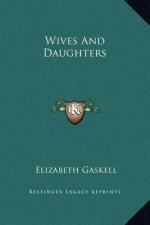eight, how induce other people who were really hungry
to commit a vulgarity before those calm and scornful
eyes? So there had been a great lull of invitations
for the Gibsons to Hollingford tea-parties. Mrs.
Gibson, whose object was to squeeze herself into ‘county
society,’ had taken this being left out of the
smaller festivities with great equanimity; but Molly
missed the kind homeliness of the parties to which
she had gone from time to time as long as she could
remember; and though, as each three-cornered note
was brought in, she grumbled a little over the loss
of another charming tete-a-tete with her father, she
really was glad to go again in the old way among old
friends. Miss Browning and Miss Phoebe were especially
compassionate towards her in her loneliness. If
they had had their will she would have dined there
every day; and she had to call upon them very frequently
in order to prevent their being hurt at her declining
the dinners. Mrs. Gibson wrote twice during her
week’s absence to her husband. That piece
of news was quite satisfactory to the Miss Brownings,
who had of late months held themselves a great deal
aloof from a house where they chose to suppose that
their presence was not wanted. In their winter
evenings they had often talked over Mr. Gibson’s
household, and having little besides conjectures to
go upon, they found the subject interminable, as they
could vary the possibilities every day. One of
their wonders was how Mr. and Mrs. Gibson really got
on together; another was whether Mrs. Gibson was extravagant
or not. Now two letters during the week of her
absence showed what was in those days considered a
very proper amount of conjugal affection. Yet
not too much—at elevenpence halfpenny postage.
A third letter would have been extravagant. Sister
looked to sister with an approving nod as Molly named
the second letter, which arrived in Hollingford the
very day before Mrs. Gibson was to return. They
had settled between themselves that two letters would
show the right amount of good feeling and proper understanding
in the Gibson family: more would have been extravagant;
only one would have been a mere matter of duty.
There had been rather a question between Miss Browning
and Miss Phoebe as to which person the second letter
(supposing it came) was to be addressed. It would
be very conjugal to write twice to Mr Gibson; and
yet it would be very pretty if Molly came in for her
share.
‘You’ve had another letter, you say, my
dear,’ asked Miss Browning, ’I daresay
Mrs. Gibson has written to you this time?’
’It is a large sheet, and Cynthia has written
on one half to me, and all the rest is to papa.’
’A very nice arrangement, I’m sure.
And what does Cynthia say? Is she enjoying herself?’
’Oh, yes, I think so. They have had a dinner-party,
and one night when mamma was at Lady Cumnor’s,
Cynthia went to the play with her cousins.’
’Upon my word! and all in one week? I do
call that dissipation. Why, Thursday would be
taken up with the journey, and Friday with resting,
and Sunday is Sunday all the world over; and they must
have written on Tuesday. Well! I hope Cynthia
won’t find Hollingford dull, that’s all,
when she comes back.’




